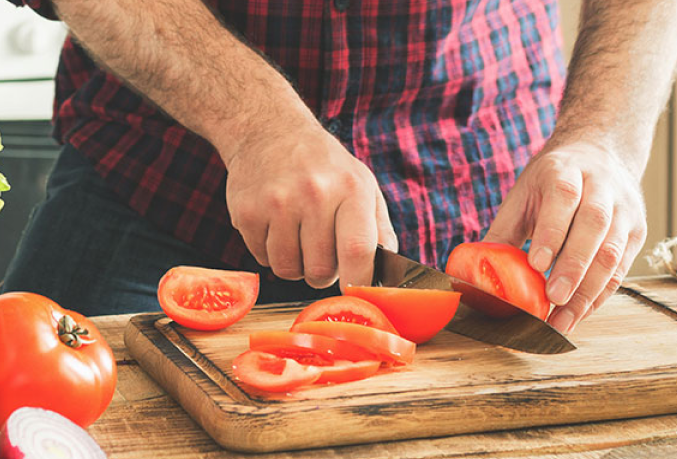Nutrition

Eating well can improve your quality of life before, during and after cancer treatment.
When you have cancer, eating often and well is important to keep up your strength and stay healthy. Our dietitians can help you manage side effects that can make eating difficult and guide you to long-term healthy eating. Talk to your doctor about a referral to a registered Dietitian (RD).
During treatment, you may have good days and bad days when it comes to food. Here are some ways to manage:
- Eat plenty of protein and calories when you can. This helps you keep up your strength and helps rebuild tissues harmed by cancer treatment.
- Eat when you have the biggest appetite. For many people, this is in the morning. You might want to eat a bigger meal early in the day and drink liquid meal replacements later on.
- It’s okay if you feel like you can’t eat a lot of different foods. Eat the foods that sound good until you are able to eat more, even if it’s the same thing again and again. You might also drink liquid meal replacements for extra nutrition.
- Do not worry if you cannot eat at all some days. Spend this time finding other ways to feel better and start eating when you can. Tell your doctor if you cannot eat for more than 2 days.
- Drink plenty of liquids. It is even more important to get plenty to drink on days when you cannot eat. Drinking a lot helps your body get the liquid it needs. Most adults should drink 8 to 12 cups of liquid a day. You may find this easier to do if you keep a water bottle nearby.
Using Food, Vitamins and Other Supplements to Fight Cancer:
- Many people want to know how they can fight cancer by eating certain foods or taking vitamins or supplements. But, there are no studies that prove that any special diet, food, vitamin, mineral, dietary supplement, herb, or combination of these can slow cancer, cure it, or keep it from coming back. In fact, some of these products can cause other problems by changing how your cancer treatment works.
- Tell your doctor, nurse, or dietitian about any vitamin, mineral, dietary supplements, or herbs you are already taking or plan to take. Also, talk with them before going on a special diet.
- For more information about complementary and alternative therapies, see Thinking About Complementary & Alternative Medicine: A Guide for People with Cancer, a booklet from the National Cancer Institute, at cancer.gov/publications/patient-education/thinking-about-cam.
Register to learn about healthy eating and cancer care.
Join our dietitians to learn about healthy eating and cancer care. Each class will be followed by a short support group. Open to all patients, caregivers and community members.
Visit St. Luke’s event calendar or call 1-866-STLUKES (785-8537), option #4.
Registration Required.